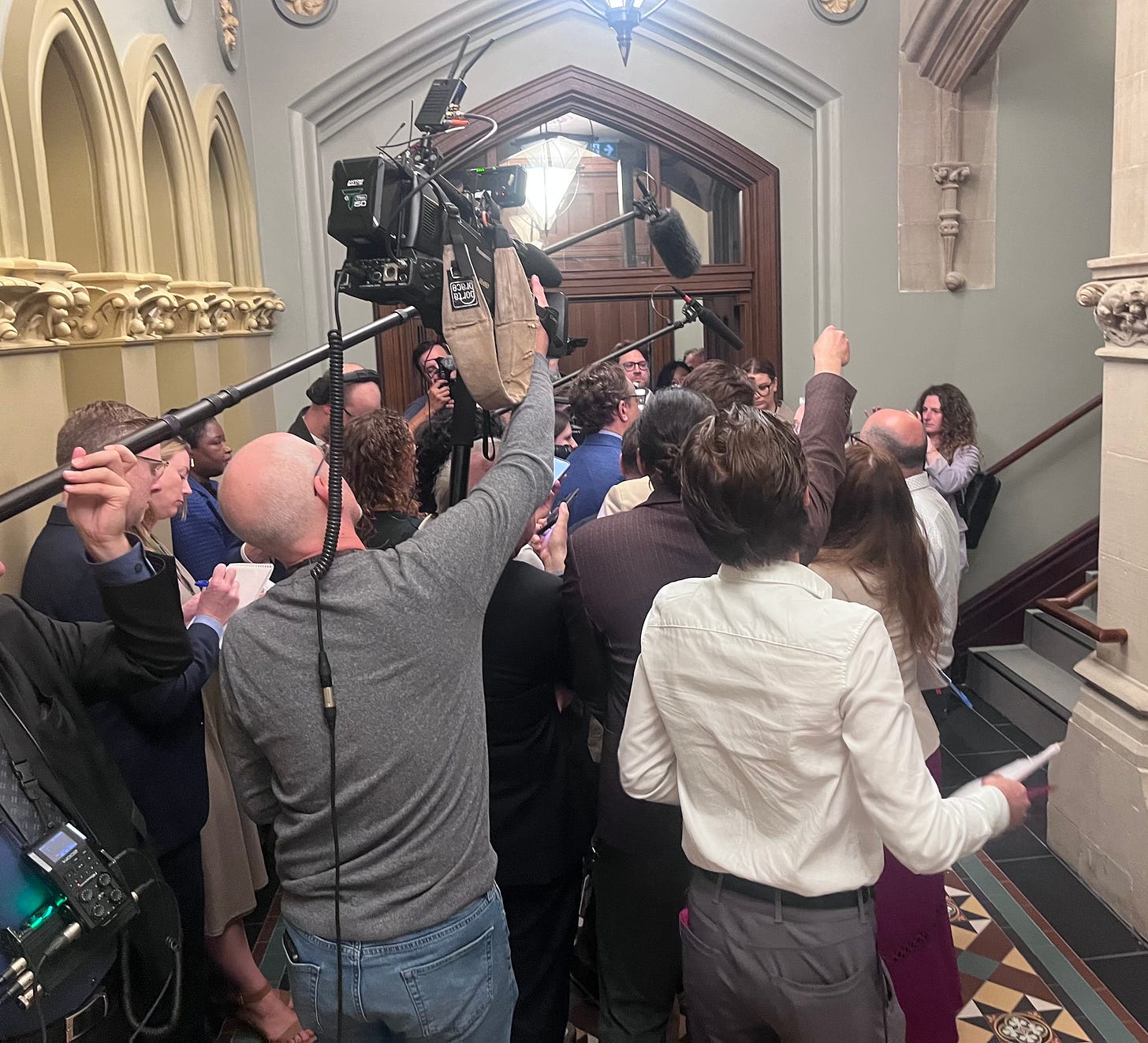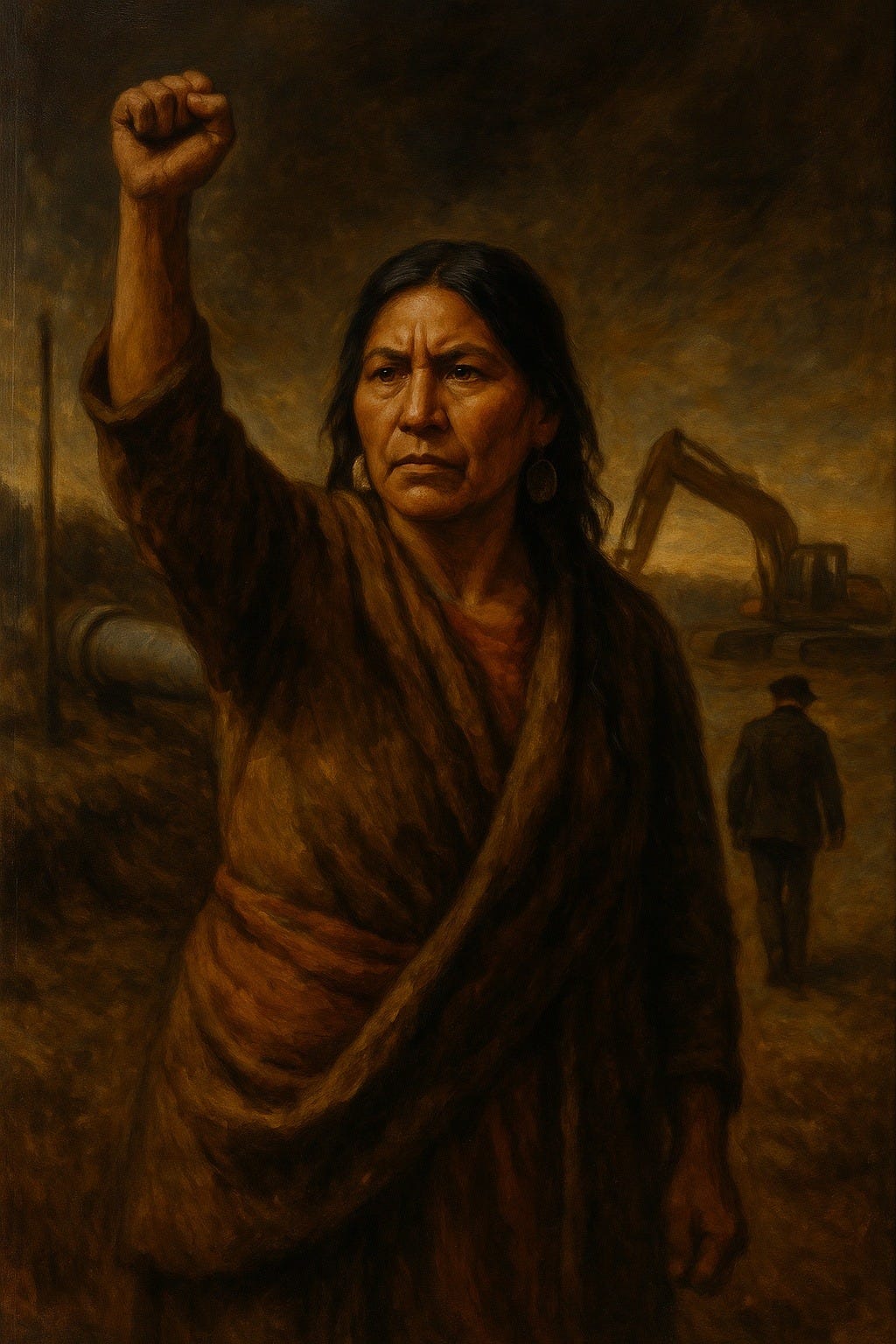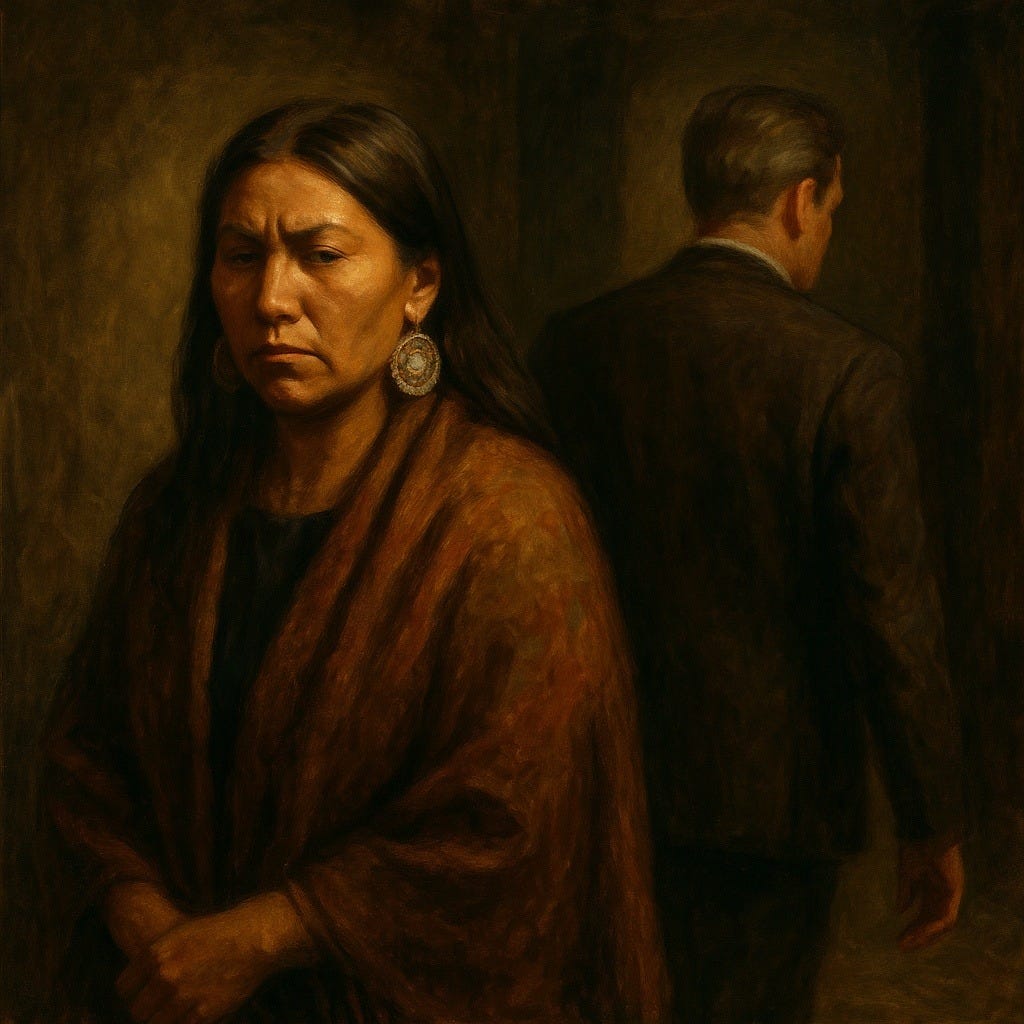Justice Minister Fraser Apologized for Saying “Veto.” But the Real Question Is: Can First Nations Say No?
If you don’t believe First Nations can say no, just like any other government can- then you probably don’t believe they’re real governments. And that’s the conversation we actually need to have.
(My analysis in this piece is - as always - based on my personal world view. Thoughts do not necessarily reflect those of my employers, colleagues, families or friends. Thankfully they love me anyway. Also: I promised a piece on Nova Scotia and fracking - that will come but this seemed more relevant to do today)
No need to apologize for the V word
Minister of Justice and Attorney General of Canada, Sean Fraser walked it back today. He apologized for saying the “v” word when he handled a question from a reporter asking whether Indigenous governments have a “veto” over resource projects (you can read the full transcript from both scrums at the bottom of this piece).
“I think my comments actually caused hurt and potentially eroded a very precarious trust that has been built up over many years to respect the rights of Indigenous People in this country…” Fraser told reporters as he entered cabinet June 4.
Fraser said he phoned AFN National Chief Cindy Woodhouse to apologize and admitted he didn’t answer the question well.
“More specifically what I should have done when faced with the question that I received was rejecting the premise of the question,” Fraser said. He added that the word veto unfairly suggests First Nations are anti-development.”
Well it wasn’t Fraser’s fault anyway - the reporter said Veto first and he was just responding. And I use the word veto all the time - I just did. Veto Veto Veto.
Ok. It's true that a growing number of people say the word veto carries negative connotations.
They say the word veto sounds negative. They say it implies that Indigenous people are just trying to block progress. But let’s be real: no matter what term we use—withhold consent, decline a project, refuse approval—this is not about which word is nicer, it is about the right to say no.
A veto by any other name … still means no
Canadian law has been dodging it for decades
This isn’t a theoretical debate. It’s a live fire drill as governments across the country are fast-tracking legislation to bulldoze barriers to resource extraction—all under the excuse of "saving the economy" from Trump’s trade threats.
Nova Scotia is prepping to lift the fracking moratorium. Quebec’s pushing ahead with legislation to speed up approvals for forestry. Ontario introduced Bill 5 to get mining projects rubber-stamped faster. B.C. passed Bill 15 to do the same for energy projects.
And Alberta? Alberta’s out here flirting with separatism and drafting referendum bills like it’s cosplay for the Wild West.
In all of this, one pattern repeats: pass the bill now, talk to First Nations later.
But here’s the inconvenient truth: under Article 32 of the United Nations Declaration on the Rights of Indigenous Peoples (UNDRIP)—the one Canada claims to uphold—Indigenous Peoples do have the right to say no.
“Indigenous peoples have the right to determine and develop priorities and strategies for the development or use of their lands or territories and other resources.”
That’s international law. And if you actually believe First Nations are governments—not just "stakeholders"—then they should be able to say no, just like the federal government can, just like any province can.
Just like how B.C. Premier David Eby flat out said NO to Alberta Premier Danielle Smith when she called for a new pipeline to run through B.C.,at the June 2 meeting with premiers. Premier David Eby gets a veto, or withholds consent, or has the right to say no. Pick whatever words - but you see my point?
If you see Indigenous nations as governments, that question answers itself.
The question is are the feds and the provinces ready to have First Nations governments at the adult table, or do we sit at the junior table with the kids?
f
Canada’s is in a “a legal grey zone” as courts favour consultations over consent.
Parliament passed the UNDRIP Act in 2021, pledging to align Canadian laws with the declaration. But four years later, we still have no clear legal test or policy that defines what “free, prior, and informed consent” actually means.
But as the United Nations Expert Mechanism on the Rights of Indigenous Peoples, says, “Withholding consent is a legitimate expression of self-determination and inclusive governance; if states or companies proceed despite it, they risk entering a legal grey zone and facing judicial or institutional challenges at national and international levels.”
Rather than negotiating free prior and informed consent with First Nations or looking to international law, the federal government is just running with existing court decisions.
A recent case where the Kebaowek First Nation challenged a nuclear company which wanted to build a waste site on their unceded territory, Federal Court Justice Julie Blackhawk ruled the government had to consult more deeply and consider Kebaowek's laws and protocols.
But even she didn’t affirm their right to say no.
Fraser had no need to apologize
What Fraser said in Tuesday’s scrum on June 3 was merely stating his government is aligning with recent court cases.
Reporter: “The government understands the principle to mean and I'm asking what, never mind the commentary, what do you and your Prime Minister understand pre, prior and informed consent to mean? Does it equal a veto?”
Fraser: “In most circumstances, I think it demands a very deep level of... engagement and understanding... The explicit nature of a veto, so from my understanding, is it stops short of a... complete veto, but it certainly... heightens the... demands upon government…”
Fraser was only being honest about where the government stands.
Why First Nations need a right to say no (or a veto) like every other government
Here are some reasons to consider.
Maybe a First Nation has no objection to a project- but they don’t want it near their homes, schools, land or water supplies. Maybe they want it rerouted for health, safety or other reasons.
Remember Standing Rock? That’s literally what happened. The original route for the Dakota Access Pipeline was near a non-Indigenous town, Bismarck, North Dakota. Bismarck wanted it redirected because of risks to their water. It was then re-routed through Standing Rock Sioux territory. The Sioux were worried about their own water - but without the right to say no to the project, it went ahead, after months of resistance. Resistance that continues to this day
Maybe a First Nation has consulted their people and developed their own economic strategy—say, ecotourism that depends on conservation— and a mine or other development is just not compatible with that. Like Onigaming
They can’t do any of those things if they can’t say no.
Maybe a First Nation just wants to negotiate better terms in a resource sharing deal to protect the land, the people, and the generations that come next. The word ‘no’ is often the only thing that brings governments and corporations back to the table with anything other than a fait accompli.
Without the right to say no, consultation is theatre. And consent is a myth.
So call it a veto. Call it withholding consent. Call it whatever you like. Just don’t pretend it’s not the core issue.
Because if you don’t believe First Nations can say no, then you don’t believe First Nations are real governments. And that’s the conversation we actually need to have.
—----
June 3, 2025 – Full Transcript
Reporter:
How does your government understand the Declaration on the Rights of Indigenous Peoples to have free, prior, and informed consent over all these projects?
Hon. Sean Fraser:
Look, I think it’s—
Reporter:
That veto is what I’m asking.
Hon. Sean Fraser:
Well, the international commentary and the limited jurisprudence that we’ve seen on it indicates that we do need to fully engage. And to the extent there’s a potential to have a more direct impact on Aboriginal and treaty rights, it demands a higher degree of engagement.
The comment has suggested to date that it is not necessarily a blanket veto power. But of course, we’re in new territory here. Over the course of the next generation, I expect the courts are going to do some significant work. But hopefully, a lot of that work is actually going to be done as between governments and Indigenous peoples themselves through—
Reporter:
So the courts will have to listen—
Hon. Sean Fraser:
—engagement and conversation.
Reporter:
—to what? The government understands the principle to mean—and I’m asking what, never mind the commentary—what do you and your Prime Minister understand “free, prior, and informed consent” to mean? Does it equal a veto?
Hon. Sean Fraser:
In most circumstances, I think it demands a very deep level of engagement and understanding of the rights that may be impacted. And to the extent that those rights can be accommodated, we should make every effort to.
The explicit nature of a veto, so from my understanding, is it stops short of a complete veto. But it certainly, in my view, heightens the demands upon government to engage fully—to both understand the nature of the rights that could be impacted by decisions taken by the government, but also the heightened duty to accommodate those rights that are baked into our treaties and protected by our Constitution.
June 4, 2025 – Full Scrum Transcript
Reporter:
(Inaudible) U.S. tariffs.
Hon. Sean Fraser:
Well, just before I deal with some of the questions, there’s something I was hoping to share with folks this morning.
Yesterday on my way into a cabinet meeting I made a couple of comments about the UN Declaration on the Rights of Indigenous Persons, and despite innocent intentions, I think my comments actually caused hurt and potentially eroded a very precarious trust that has been built up over many years to respect the rights of Indigenous People in this country.
It’s essential that we work in partnership with Indigenous partners when it comes to issues that engage their rights and demand the respect of the Crown.
I had a call last night after National Chief Woodhouse reached out expressing her frustration, and I told her unequivocally that I wanted to apologize for some of the comments.
More specifically, what I should have done when faced with the question that I received was reject the premise of the question.
The UN Declaration, when it comes to free, prior, and informed consent, is about establishing a process based on respect and partnership as between the Crown and Indigenous Peoples.
I think sometimes the conversation falls into a frankly dangerous [inaudible] that paints a false picture of Indigenous People as being anti-development somehow.
In my experience engaging with Indigenous leaders, their perspective is one of wanting to have their rights respected and wanting to share in the benefits of development.
So as we go forward—whether it’s on the major projects initiative we’ll be working on, or any issue that touches on the rights of Indigenous Peoples—I want to be absolutely clear that our desire is to work in partnership.
At every stage of the process, from project selection to conditions that may be imposed, we’re going to engage, properly consult, and work in partnership to respect the rights of Indigenous Peoples.
Reporters (crosstalk):
Do you still believe that it’s (inaudible)?
Hon. Sean Fraser:
Well, I think today and going forward, I think I learned my lesson yesterday.
I need to be very clear that we need to reject the premise of that question because—
Reporter:
Which is?
Hon. Sean Fraser:
—that if—well, I think it paints a false picture of what the Declaration is—
Reporter:
(Crosstalk) What’s the false picture that—(inaudible)?
Hon. Sean Fraser (off mic):
Well, the question assumes that when we deal with resource development, we deal with issues that deal with the rights of Indigenous Peoples.
If we have a government and [inaudible] in competition with one another, the purpose of [inaudible] free, prior, and informed consent is to establish a process [inaudible] working together in our common interest [inaudible] Canada and also to protect and respect the rights of Indigenous Peoples.
Reporters (crosstalk):
Who asked you to apologize? Did—
Hon. Sean Fraser:
No, nobody. I’ve—
Reporter:
Did you apologize to the National Chief?
Hon. Sean Fraser:
I did, and I told her that I would do so publicly soon as well.
And this is completely on my own initiative. I’ve not been asked to do this by anyone.
She said that she would appreciate if I would offer some clarity, but this is not coming from anyone within government. This is something I feel compelled to do.
I’ve come into a position that I think is essential in the process of respecting the rights of Indigenous Peoples, and I wanted to make sure that not just Chief Woodhouse but Indigenous leaders—Indigenous Peoples across this country—know that my desire and the Government of Canada’s desire is to move forward on a relationship—(crosstalk)
Reporter:
(Crosstalk) What specifically was the National Chief’s issue with your comments?
Hon. Sean Fraser:
Well, look, I’m not going to speak for the National Chief. I think you can put that question to her.
Reporter:
What specifically did you—what specifically are you—did you apologize for in your comments? Like, what did you say that you think, “Ah, I shouldn’t have said that”?
Hon. Sean Fraser:
Well, I think it was the discussion that I had with [inaudible] yesterday, and though the bulk of the conversation was about the need to work in partnership and to respect the rights of Indigenous Peoples, I think even accepting the premise of the question that was put to me really made people feel like there may be an attempt by the government to work unilaterally, not in partnership.
Reporter:
(Crosstalk) Was it your use of the language “veto”?
Reporter:
(Crosstalk) When did you realize you made a mistake?
Reporter:
It’s stripping away (inaudible) rights to due process. It’s allowing them—disallowing them from making the asylum claims if they’ve been in the country for over a year. Why are you taking this approach?
Hon. Sean Fraser:
Well, there are procedural opportunities for people, including the opportunity to have a pre-removal risk assessment.
We went through the bill to make sure that we have the tools that are necessary to protect the integrity of the border, also to protect the rights of Canadians, and to be in compliance with the Charter while at the same time strengthening the border when it comes to a number of different issues, including the—(crosstalk)
Reporter:
(Crosstalk) You know that your courts are already backlogged when it comes to immigration cases specifically. So aren’t you just kicking the problem somewhere else if you are viewing it as a problem?
Hon. Sean Fraser:
Well, I think there are certainly efficiencies that we need to work on on the processing side of things too.
But I would disagree with the idea that would be a reason not to address one issue because it may create other issues.
We need to be able to do two things at once, including strengthening the integrity of the border but at the same time addressing the processing challenges.
Reporter:
On the tariffs—
Reporter:
(Crosstalk) How do you respond to the tariffs?
Hon. Sean Fraser:
I’ve got to go, and I don’t want to be—(inaudible)
Reporter:
Will you make changes to the bill if concerns—(inaudible)
Hon. Sean Fraser:
If you want to try to catch me on the way out—okay. Thank you.








Not discounting any of what you said here, but provinces don't have a veto. BC did not agree to building an oil pipeline through the province to Vancouver. It was built anyways. Feds said too bad so sad.
Tim Horton's says Sean Fraser was a good immigration minister